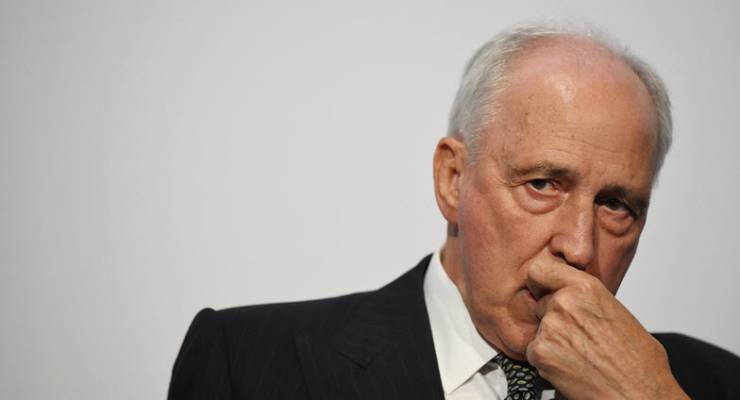
Australian engagement with Asia is not a temporary enthusiasm. Asia is not a flavour of the month. We have not been on a 10-day package tour from which we can return with a couple of T-shirts and a handful of colour prints for the album. Australia can’t bolt on the Evinrude and motor off to the coast of California.
Paul Keating, March 1998
Under Prime Minister Scott Morrison, however, Australia apparently can bolt on a nuclear reactor and motor over to California, as part of a return to the glory days of white anglophone imperialism, seeking — to paraphrase Keating’s famous words — security from Asia, not in Asia.
Keating’s savage assault on both the government’s surrender of sovereignty in any mooted nuclear submarines deal — when/if it happens, some decades hence — and Labor’s supine response, is missing some important caveats and contexts.
Keating never had to deal with a more aggressive China when he was prime minister — for that matter, while the rise of China was of strategic importance to Australia’s national security considerations, no prime minister until Malcolm Turnbull had to really deal with it.
Indeed, despite his latter-day conversion to China hawk, Turnbull’s predecessor, Tony Abbott, cheered on by the likes of Paul Kelly at News Corp, was even more of a Sinophile than Keating. Keating in post-political life has traditionally been angrily dismissive of criticisms of China’s systemic, industrial-scale human rights abuses, urging us to instead focus on its remarkable achievement of lifting hundreds of millions out of poverty.
Casting China’s actions in the South China Sea as merely “unwise”, as Keating did, seems an understatement of extraordinary magnitude. And belting Penny Wong for her complicity with the Coalition on portraying China as a threat is wholly unfair given her repeated criticisms of the government for whipping up fear of China for domestic political gain — and being accused, in effect, of treason by News Corp for doing so.
But Keating makes some unanswerable points: it is the US that invades other countries (with Australia dutifully carrying its spears as it does so), not China. And, most particularly, “so poisonous are the Liberals towards China they are prepared for Australia to lose its way in the neighbourhood of Asia, in search of Australia’s security from Asia, by submission to yet another strategic guarantor”.
This shines a light on a key distinction between the participants in this debate — Keating on one side, Labor, the Coalition and media hawks on the other. Keating’s views — however problematic his reluctance to critique Beijing’s behaviour — spring from a coherent philosophy that links foreign policy and economic policy (and, Keating would argue, domestic policy on issues such as reconciliation). Seeking security in the region, not from the region, isn’t a slogan but sums up a complex vision of Australia’s history, geography and economy — one that the subsequent economic rise of China has wholly vindicated.
Those who weren’t around in the 1980s and early ’90s, or can’t remember them, won’t be aware of just how contested and criticised Keating’s emphasis on regional engagement was — his efforts to step up Australia’s relationship with Suharto-era Indonesia, his engagement with Japan (then at the height of its economic power, though just beginning its slide into the lost decades), his conviction that Australia’s future lay with its geography, not its history.
With 21st century Australia relying on China for exports as varied as iron ore and education, it’s unthinkable now that it would ever have been a matter of dispute. But most assuredly it was, especially from the Coalition — and especially given John Howard was best known before becoming prime minister for criticising Asian immigration to Australia.
Succeeding Keating, Howard would say that Australia didn’t have to choose between our history and geography, and gave effect to that by following the US in its illegal invasions while engaging with China — war criminal George W Bush and human rights abuser Hu Jintao addressed Parliament on consecutive days in 2003.
Along the way, Howard ditched the more complex demands of multilateralism (until given the chance to host APEC) in favour of the Coalition’s preferred approach of bilateral engagement. A decade later and Abbott was still joined at the hip with the US but boasting of his free trade deal with Xi, promising the Chinese an extradition treaty and damning anyone who criticised the deal as racist. A few years later still and China is now the great existential threat that requires an alliance of white powers.
There simply is no coherent foreign policy (let alone combined foreign/domestic policy) within the Coalition; it is driven by domestic political opportunism only — and at the expense not merely of relations with major powers like France, but of our own region, with the government now desperately trying to reassure regional partners about the implications of AUKUS, which, as Wong reminded us today, is essentially a plan to maybe do stuff involving technology.
Labor’s challenge is to articulate how its “yes, but” response to AUKUS is founded in something more coherent than the Coalition’s “we’ve always been at war with east Asia” line. But its days of being able to lead foreign policy debate in the face of resistance from the media and the Coalition — which Keating did so expertly — are long behind it.








Crikey is committed to hosting lively discussions. Help us keep the conversation useful, interesting and welcoming. We aim to publish comments quickly in the interest of promoting robust conversation, but we’re a small team and we deploy filters to protect against legal risk. Occasionally your comment may be held up while we review, but we’re working as fast as we can to keep the conversation rolling.
The Crikey comment section is members-only content. Please subscribe to leave a comment.
The Crikey comment section is members-only content. Please login to leave a comment.